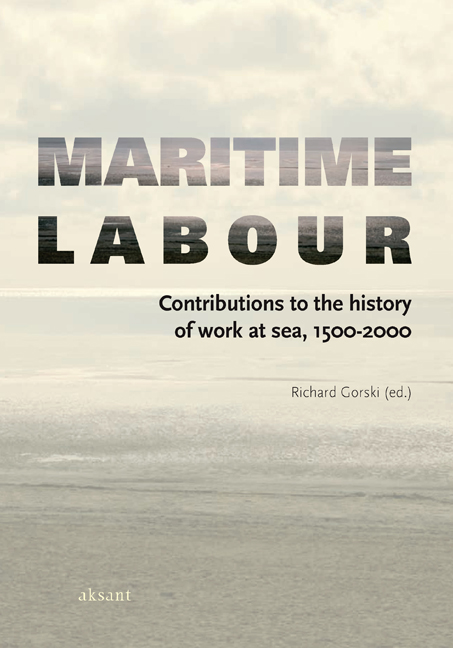Book contents
- Frontmatter
- Contents
- Introduction
- Six Cross-sections of the Dutch Maritime Labour Market: A Preliminary Reconstruction and its Implications (1610-1850)
- On Maritime Labour and Maritime Labour Markets in Germany, 1700-1900
- Swedish Naval Personnel in the Merchant Marine and in Foreign Naval Service in the Eighteenth Century
- Quantifying British Seafarers, 1789-1828
- ‘But for the Loves of the Fishes’: Maritime Labour and Ecological Culture in Nineteenth-century Newfoundland
- The Shipping Federation and the Free Labour Movement: A Comparative Study of Waterfront and Maritime Industrial Relations, c.1889-1891
- Health and Safety Aboard British Merchant Ships: The Case of First Aid Instruction, 1881-1908
- British Merchant Marine Engineer Licensing, 1865-1925
- Transatlantic Fishers: New England and British Trawlermen, 1960-1972
- Masters and chiefs: Enabling globalization, 1975-1995
- About the Contributors
Transatlantic Fishers: New England and British Trawlermen, 1960-1972
Published online by Cambridge University Press: 26 January 2021
- Frontmatter
- Contents
- Introduction
- Six Cross-sections of the Dutch Maritime Labour Market: A Preliminary Reconstruction and its Implications (1610-1850)
- On Maritime Labour and Maritime Labour Markets in Germany, 1700-1900
- Swedish Naval Personnel in the Merchant Marine and in Foreign Naval Service in the Eighteenth Century
- Quantifying British Seafarers, 1789-1828
- ‘But for the Loves of the Fishes’: Maritime Labour and Ecological Culture in Nineteenth-century Newfoundland
- The Shipping Federation and the Free Labour Movement: A Comparative Study of Waterfront and Maritime Industrial Relations, c.1889-1891
- Health and Safety Aboard British Merchant Ships: The Case of First Aid Instruction, 1881-1908
- British Merchant Marine Engineer Licensing, 1865-1925
- Transatlantic Fishers: New England and British Trawlermen, 1960-1972
- Masters and chiefs: Enabling globalization, 1975-1995
- About the Contributors
Summary
Introduction
During the 1960s the respective working worlds of New England and British trawlermen were undergoing a painful transition. Fears of foreign competition were rampant, and there was increasing dissatisfaction with safety aboard ship. How each group perceived their changing circumstances says much for a universal appreciation of work across international frontiers. A transnational focus on Atlantic fishers has much to commend it. On a daily basis fishing vessels from Europe and the United States shared the same work space. The Atlantic Ocean was a shared platform, but during the 1960s the Atlantic fisheries were also under intense threat and undergoing change. As fishing technologies improved, and stiffer competition developed, both sets of workers experienced dramatic changes in their work. For New England fishers, foreign competition highlighted their already weakened position. Their fishing fleet was already old. Fifty per cent of the large trawlers fishing out of New England were more than twenty years old. There was a steady decline in the numbers of fishing trawlers: in 1947 there were 117 trawlers but by 1962 the total had declined to 57. There was a concomitant decline in fish landings because of the old age of the ships.
British fishers were experiencing a different phenomenon of being excluded from fishing off Iceland, Norway, and the Faroes; but much of their concern was over safety at sea. A series of disasters in the 1960s where trawlers were lost with all hands highlighted the precarious nature of fishing. It had always been a dangerous occupation, fraught with peril. A steady decline in recruitment epitomized an extraordinary shift away from the industry. Correspondingly, the workforce was getting older and those that did enter the industry were migratory workers not necessarily connected to the industry by familial relations.
To grasp the challenges that the fishers in New England and England faced, I will profile who these men were, their origins, their work life, particularly their age and accident records, and what concerned them during the 1960s. What is clear is that each work group confronted obstacles to their respective livelihoods. Each in their own way came to terms with these different threats by calling on governments for support and help.
- Type
- Chapter
- Information
- Maritime LabourContributions to the History of Work at Sea, 1500–2000, pp. 219 - 234Publisher: Amsterdam University PressPrint publication year: 2008



